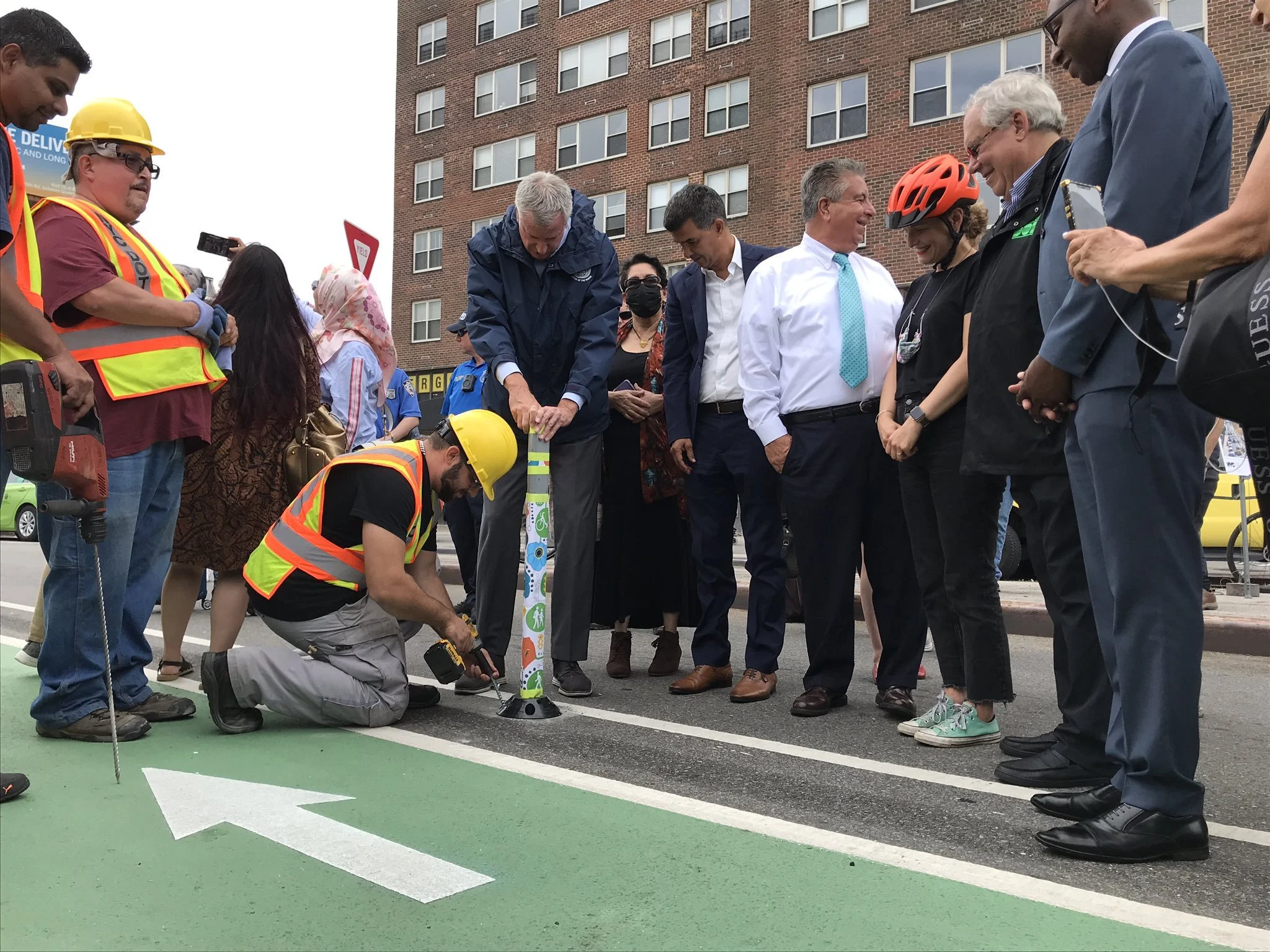Final connection of Queens Blvd bike lane divides community
/Phase 4 of the Queens Boulevard Bike lane is expected to be completed by the end of the month. Photo via DOT/Twitter
By Emily Schutz
On any given day along Queens Boulevard, restaurant patrons sit and eat in makeshift covered dining areas. What is easily overlooked to the casual patron, though, are the delivery couriers with their bikes or mopeds talking with each other on the curb, waiting for their next order. When the time comes to complete a delivery, they go straight to the bike lanes, unless, of course, there are none.
Until recently, Queens Boulevard in Kew Gardens lacked bike lanes from Yellowstone Boulevard to Union Turnpike, which forced delivery couriers, and other cyclists, to pedal on the sidewalk or in the road with car drivers.
“They definitely need bike lanes over there,” said Jeremy Ayala, a 23-year-old who has been delivering for a variety of apps for the last seven months.
Many of these delivery couriers are excited about the nearly completed extension of bike lanes on Queens Boulevard, which was years in the making. Queens Boulevard was formerly nicknamed the “Boulevard of Death” due to the large number of accidents killing pedestrians and drivers there – 186 people were killed on the street between 1990 and 2017.
Jacob deCastro, a spokesperson for the bike advocacy group Transportation Alternatives, said the city hopes to transform the street into the “Boulevard of Life,” with the completion of the project on October 29.
Not everyone in Kew Gardens is thrilled about the completion of the project, though. In Facebook groups and community board meetings, residents have expressed their concerns about the reduction in parking and the increase in traffic that comes with the bike lane project.
One resident, Wass Noor, recognizes that there are both pros and cons to extending the bike lanes on Queens Boulevard.
“Now yes, we need bike lanes. I think there’s a lot of people biking, especially with COVID and everything.” Noor said “But the con is so many parking spots are gone and during the times that no one is using the bike lanes you can’t park. There are traffic jams everywhere.”
Rachel Weinberger, a professor of infrastructure at Columbia University believes that the bike lane project will be worth it, as it improves the safety of cyclists.
“When you separate vulnerable users like pedestrians or cyclists, which are very light and very exposed, from fast moving heavy vehicles, that improves safety outcomes immeasurably,” Weinberger said. “It doesn’t eradicate the possibility of a collision or crash, especially a severe injury or fatality, but it certainly helps.”
Couriers in Kew Gardens seem to agree. Uber Eats and DoorDash employee Sean Miah said he uses his bike to get from restaurants to customers, and back to the restaurants again, delivering for around six hours, five days a week, rain, or shine. He believes that more bike lanes mean safer trips.
Resident Carol Fucci says that her primary concern with the project is the loss of the 200 parking spaces that the bike lanes will replace upon completion of the project, according to plans from the Department of Transportation.
“I think that it’s going to harm businesses,” Fucci said, recalling a few instances when she could not find parking near some of her usual shops and restaurants. “I see it already.”
When presented with the concerns of some of the community members Dwayne Baker, professor of infrastructure and transportation at Queens College, wasn’t confident that businesses would fail because of the project. Rather, he suggested that many residents are likely walking to the business already, rather than driving to them.
“There’s also a lot of side streets along Queens Boulevard where parking is freely available, so I honestly don’t think it’s going to impact that too much, if at all, negatively or positively,” Baker said. “Again, it’s just people are used to being able to park there. Now, you have to change.”
But the lack of parking is more than an inconvenience for some. Residents with disabilities and their caretakers have some concerns about the project.
Glenn Dewar is a longtime caretaker for his late partner who suffered from cancer. He questions whether those who are disabled or chronically ill will be able to find parking for doctor’s appointments and said he’s experienced difficulty with the removal of parking spaces in the past.
Dewar says the bike lane project is another step in the fight to “get rid of cars in cities,” a premise that he believes does not consider the disabled or low-income community in Queens.
“Attacks on street parking are direct attacks on the poor and middle-class drivers who come home from late shifts,” Dewar said. “They are certainly not rich, and they are the ones forced to sell cars when parking is hardest to find at those early hours of the morning.”
Margarita Anosova is a courier for Uber Eats, GrubHub, Relay, Instacart, Shipped, Amazon Flex, and occasionally DoorDash. Although she recognizes that the presence of cyclists can be inconvenient for drivers, she is adamant that everyone should prioritize safety on the roads.
“Anybody’s life is more important than trying to get somewhere, a few minutes faster or on time or whatever,” Anosova said. “And I think bike lane, no bike lane, that’s really what we gotta take away from this, is that everybody’s life matters.”




